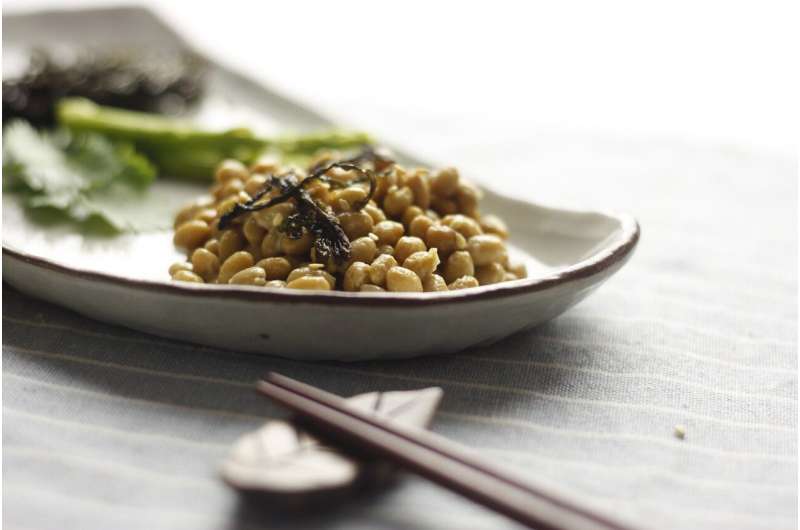This article has been reviewed according to Science X's editorial process and policies. Editors have highlighted the following attributes while ensuring the content's credibility:
fact-checked
peer-reviewed publication
trusted source
proofread
Study finds natto consumption inhibits arteriosclerosis by altering intestinal microflora, suppressing inflammation

Natto is widely recognized for inhibiting arteriosclerosis, yet its underlying mechanism remains elusive. Researchers led by the University of Tsukuba studied the effects of natto on arteriosclerosis in mice. The findings, published in Scientific Reports showed that consuming natto induced changes in the intestinal microflora, suppressing inflammation and preventing arteriosclerosis.
Atherosclerosis, a chronic condition characterized by the accumulation of lipid and inflammatory cells within the blood vessel walls, causes cardiovascular diseases, such as heart disease and stroke. Natto, a food rich in vitamin K2, has shown promise in mitigating cardiovascular diseases by enhancing arterial flexibility and modulating inflammatory responses. However, the way natto suppresses arteriosclerosis had remained elusive.
This study employed three varieties of natto distinguished by their vitamin K2 content—namely, high vitamin K2, normal, and low vitamin K2 natto. The research team systematically assessed the impact of natto on atherosclerosis in a mouse model over time. The findings revealed a significant reduction in atherosclerotic lesions across all natto consumption groups. Furthermore, the intake of natto altered the composition of intestinal microflora, regulating the production of cytokines and chemokines associated with arteriosclerosis.
This suggests that incorporating natto into the diet may have a therapeutic effect on arteriosclerosis. Additionally, the study uncovered that adding Bacillus subtilis natto to macrophages, a cell type implicated in promoting arteriosclerosis, decreased pro-inflammatory cytokines and chemokines. The effect was particularly significant with high vitamin K2 natto consumption group. Moreover, both regular and low vitamin K2 natto increased the production of the anti-inflammatory cytokine IL-10.
These findings indicate that Bacillus subtilis natto, aside from its role as an intestinal bacterium, may inhibit atherosclerosis by altering the intestinal microflora and suppressing the activation of immune cells.
More information: Takeshi Kawamata et al, Natto consumption suppresses atherosclerotic plaque progression in LDL receptor-deficient mice transplanted with iRFP-expressing hematopoietic cells, Scientific Reports (2023). DOI: 10.1038/s41598-023-48562-y



















